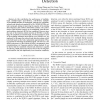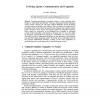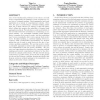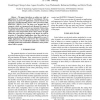58 search results - page 5 / 12 » On Rank vs. Communication Complexity |
152
click to vote
PODS
2012
ACM
13 years 5 months ago
2012
ACM
We show that randomization can lead to significant improvements for a few fundamental problems in distributed tracking. Our basis is the count-tracking problem, where there are k...
106
click to vote
VTC
2007
IEEE
15 years 9 months ago
2007
IEEE
Abstract—In this contribution the performance of multipleinput multiple-output space-division, code-division multipleaccess (MIMO SCDMA) is investigated, when the low-complexity ...
141
click to vote
AISADM
2005
Springer
15 years 8 months ago
2005
Springer
Computer programming of complex systems is a time consuming effort. Results are often brittle and inflexible. Evolving, self-learning flexible multi-agent systems remain a distant ...
134
Voted
SIGECOM
2010
ACM
15 years 7 months ago
2010
ACM
One of the fundamental problems in the theory of social choice is aggregating the rankings of a set of agents (or voters) into a consensus ranking. Rank aggregation has found appl...
133
click to vote
ROMAN
2007
IEEE
15 years 9 months ago
2007
IEEE
– The paper introduces an online user study on applications for social robots with 127 participants. The potential users proposed 570 application scenarios based on the appearanc...



